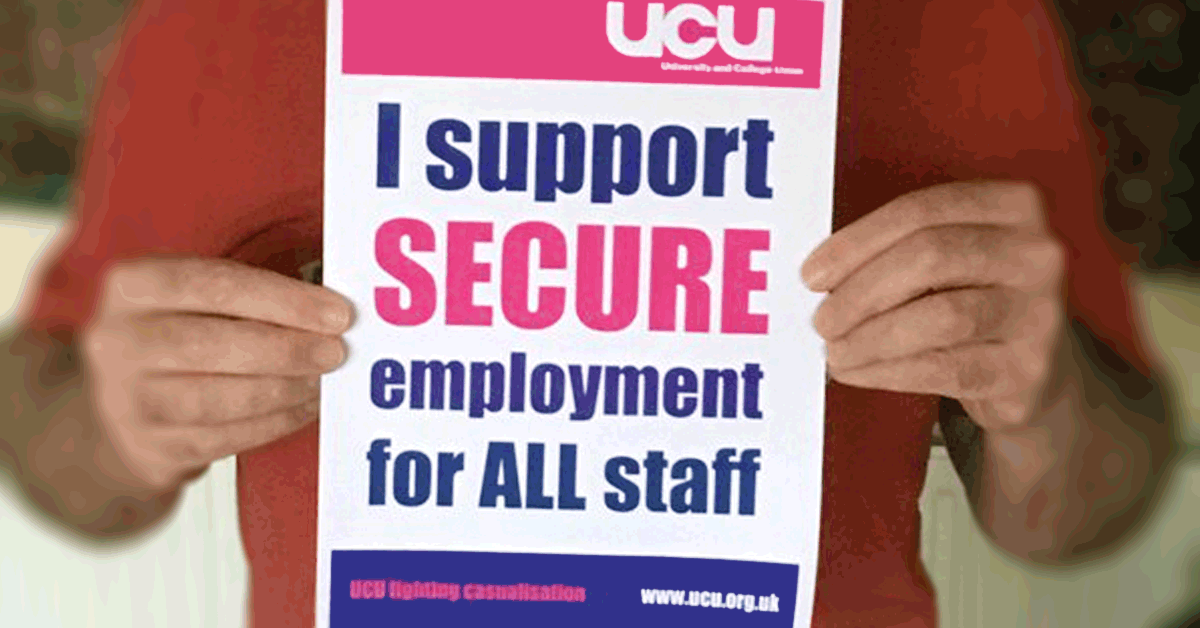Casualised staff are second-class citizens, warns report
20 January 2020
Staff on casualised contracts in UK universities are vulnerable and invisible 'second-class academics', says a new report released today.
The report says universities' bold statements about how much they value their staff ring hollow when put against how thousands of staff without secure contracts staff are treated. 'Second class academic citizens', by Nick Megoran and Olivia Mason of Newcastle University for UCU, identifies four ways in which casualised academic labour is 'dehumanising'.
Based on extended interviews with academic staff, the report says casualised staff are:
- rendered invisible and treated as second-class academic citizens
- left vulnerable to exploitative practices
- denied the academic freedom that should be a hallmark of an academic career
- prevented from being able to plan a professional or personal life.
Casualisation is a significant problem for UK higher education. The latest data from the Higher Education Statistics Agency shows that two-thirds of researchers (67%) are on fixed-term contracts and almost half of teaching-only staff (49%) are employed on fixed-term contracts. On top of that there are over 6,500 academic staff with zero-hours contracts and a further 68,845 academic staff who hold 'atypical' contracts.
The report, which is being launched at an event in the Houses of Parliament this afternoon, calls on the government to insist that universities are honest about the extent of casualisation and instruct the Office for Students to demand comprehensive data about universities' use of casualised staff. It also calls for individual universities to work with UCU to negotiate the transition of casualised staff onto more secure contracts.
One interviewee talks about how the bubble quickly burst on 'the best job in the world' when it was apparent how she would be treated differently to her colleagues. From seemingly trivial matters, such as not having her name on her door, to being told she had to do all her own admin, she says that her and her colleagues found themselves in the 'sweatshop of academia'.
Another complained about the amount of time she had to spend applying for jobs. She said that the nature of temporary contracts meant that sometimes she would have to start applying for jobs as soon as she took up a new position.
Others told how they were not given adequate time for teaching preparation, which chimed with previous work from UCU that warned how the widespread use of casual contracts was damaging the quality of research and the education students receive. Casualised staff have previously said they lacked access to adequate teaching facilities or places where they can meet students to discuss their work.
Previous UCU research has revealed that casualised staff say the lack of security is damaging their mental and physical health, while holding down multiple jobs and struggling to pay the bills. Over two-thirds of respondents (71%) said they believed their mental health had been damaged by working on insecure contracts and more than two-fifths (43%) said it had impacted on their physical wellbeing.
The union said research in the US shows that students who take large numbers of courses with teachers employed on insecure contracts, or who are in institutions with large numbers of non-permanent staff, tend to graduate at a lower rate and are more likely to drop out of college.
The Delphi Project argues that, no matter how good they are as teachers, those employed on casual contracts have working conditions that make it impossible for them to consistently reproduce the high quality interactions with students that can be achieved by those on decent, secure contracts.
UCU members at 60 UK universities took strike action before Christmas in disputes over pensions and over pay and conditions, including over casualisation. Members at a further 37 universities are being balloted for strike action in polls that close on 28 January.
UCU general secretary Jo Grady said: 'Universities need to understand this is a real problem that must be dealt with, not excused or underplayed. Some institutions have worked with us to move staff on to more secure contracts, but overall the higher education sector is too happy to exploit its army of casualised staff.
'We need to have an honest conversation about casualisation that draws out the real extent of the problem and how we can secure improvements for staff. The Office for Students should demand that universities disclose the extent of teaching - measured in classroom hours - that is being done by casualised staff. Students would be shocked by the levels of casualisation in universities and the toll that being in insecure employment takes on people.'
- PrintPrint this page
- Share




Comments